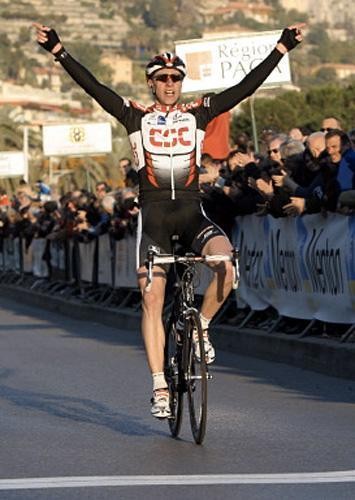An interview with Jens Voigt
A relentless fighter with a reputation for solo attacks, Jens Voigt has had one of the most...

The escape artist
A relentless fighter with a reputation for solo attacks, Jens Voigt has had one of the most successful early seasons of his career and is now taking a break to recharge his batteries before the Tour de France. When she asked him about 'his' Liège, the rise and fall of breakaways, a change of strategy and his 2005 Giro tip, Cyclingnews' Hedwig Kröner found out Voigt talks just as he races: once you've got him going, there's nothing you can do to stop him!
Team CSC's Jens Voigt has had a pretty successful spring this year. At the Tour Méditerranéen, he won two stages as well as the general classification; he took the prologue at Paris-Nice and finished fourth after helping his teammate Bobby Julich to overall victory; he was the first to cross the finish line at stage five of Pais Vasco and secured another stage win at the Etoile de Bessèges. Just recently, the man whom the French call 'the German Jacky Durand' impressed with a second placing behind Alexandre Vinokourov at Liège-Bastogne-Liège, after performing one of his dreaded solo kamikaze rides just a few days prior at Flèche Wallonne.
Cyclingnews: Let's talk about your breakaway with Vinokourov in Liège. When did you think that the two of you would actually make it to the finish in front of the chasers?
Jens Voigt: Well, I actually believed in that break very soon. I'm an optimist by profession! [laughs] On Wednesday [at Flèche Wallonne], I was in the lead group for 150 km, including the 50 km on my own, and I almost made it then, too. In Liège, I had Vinokourov with me, who is an excellent rider, a similar fighter as I am. He was in good form and can ride long distances at high paces. Plus, that made one team less to chase in the back, as T-Mobile's Kessler was there too and the team was pretty active that day.
As we gained a minute on them, I thought we'd make it, also because you could sense that they weren't agreeing in the chase behind. The favourites looked at each other, and as T-Mobile and CSC had made the race a fast one before, Di Luca for example was on his own - he didn't have a teammate anymore in the group because they had had to work a lot before. Of course, the leader of a team doesn't want to work in the front, as he usually gets brought to the place of his attack by a teammate. So nobody knew what to do anymore - 'Should I go after them now or wait until a teammate bridges up to me?' they asked themselves. That was our chance to go for victory.
Click here for the full interview
Get The Leadout Newsletter
The latest race content, interviews, features, reviews and expert buying guides, direct to your inbox!